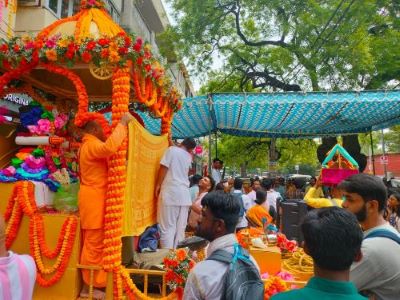The following piece seeks to understand the superimposition of dominant ideological narratives on cultural events. It does not, in any way attempt to disrespect the cultural/religious beliefs of individuals.
Delhi University has often been described as an educational space for multiculturalism and diversity, where students from all over India intermingle and share their cultures with one another. Very often, students bring to the university campus, festivals and celebrations from different corners of the country which helps them create a sense of community far from home. It is an act of claiming a space, far from one’s homeland that initiates intercultural interaction and contributes to the richness of the campus spaces.
However, is the culturally diverse space that many of us would like the university to be, a utopian imagination? Cultural expression is often monopolised by dominant majoritarian communities that can afford to be more visible and vocal. How do we distinguish free cultural expression from ideological imposition? Furthermore, what happens when politically motivated ideologies are superimposed on cultural festivals?
On 22nd June, the Delhi Odia Students’ Association (DOSA) in collaboration with the Iskcon Student Centre organised the Jagannath Rath Yatra in the North Campus of Delhi University. It goes without saying that the Rath Yatra is a festival that is extremely close to the hearts of the devotees of Lord Jagannath. People from different socio-economic backgrounds come to join the procession, hoping to get a glimpse of the deity. People are often seen crying, overwhelmed to see the lord.
But can an event that is often hailed for its inclusive quality, retain its cultural ideals and innocence when it becomes so visibly saffronised? It is true that perhaps every cultural or religious festival is influenced by certain belief systems, but when the belief system is aligned with an ideology which translates into an aggressively asserted political agenda, it becomes potentially dangerous.
The political alignment of the procession organised in the campus was not simply reflected in symbols, but was also verbalised on certain occasions. The event began with an open and unapologetic assertion- ‘Bharat ka dharam, Sanatan dharam’, (The religion of India is Hinduism) and ended with Jai Shree Ram chants. The procession, adorned by huge saffron flags, traced the campus with hundreds of people joining in. The devotees danced and sang along; the sentimental and cultural essence of the procession could be felt. At the same time, the markers of it being a politically aligned procession were hard to ignore.
One could obviously argue that Jai Shri Ram chants in a Jagannath yatra is not arbitrary because Ram and Jagannath are essentially different avatars of Lord Vishnu. In today’s India however, Jai Shri Ram is an immensely politicized slogan – one that is rooted in majoritarian beliefs of Hindutva. To say that it is an innocent appeal to lord Ram is to disregard the persecution faced by thousands of people from minority communities, against whom the slogan has been weaponised.
Before the commencement of the yatra, an elaborate speech was given which emphasised upon values of devotion, servitude and gratitude. The cultural belief system of a Brahmanical conception of Hinduism was presented as the moral standards of India. While science, modernism and ‘western’ values received censure, the ‘Indian’ way of life was pedestalised. It must be noted that the Jagannath Rath Yatra at Puri has no custom of preaching. Everybody joins the event as a devotee and no authority figure is given the centre stage. Representatives from the Akhil Bhartiya Vidyarthi Parishad (ABVP) – a right wing student organisation affiliated with the Hindu nationalist RSS – were formally present in the event.
The Rath Yatra was provided immense police protection. It is entirely valid to ensure police deployment in cultural festivals to ensure orderly execution of the same. However, the sincerity with which police protection is provided to events that exude right wing sentiments is entirely absent when students get attacked by mobs on campus. When a mob of men, gate-crashed the college fest at Indraprastha College for Women, raised misogynistic slogans and Jai Shri Ram chants and harassed women, the police did little to ensure their safety. The police has acted either as passive observers or violent upholders of law in situations like these.
When a religious event is distorted and appropriated to further a political ideology, the cultural and emotional essence of the festival is hurt and disrespected. Although the devotees attending the rath yatra did not express concern regarding the nature of the yatra, the ideological undertones were felt without doubt.
The Jagannath Yatra is very close to our hearts. Devotees wish to remain connected with the lord Jagannath and seek his blessings. It is an expression of unadulterated and innocent devotion. It is not supposed to be used to further any ideological agenda” – Aditi Routray, a student at LSR
Featured image credits – Tulip for DU Beat
Read also – https://dubeat.com/2023/04/04/the-invasion-of-ipcw-a-students-account/
Tulip Banerjee




